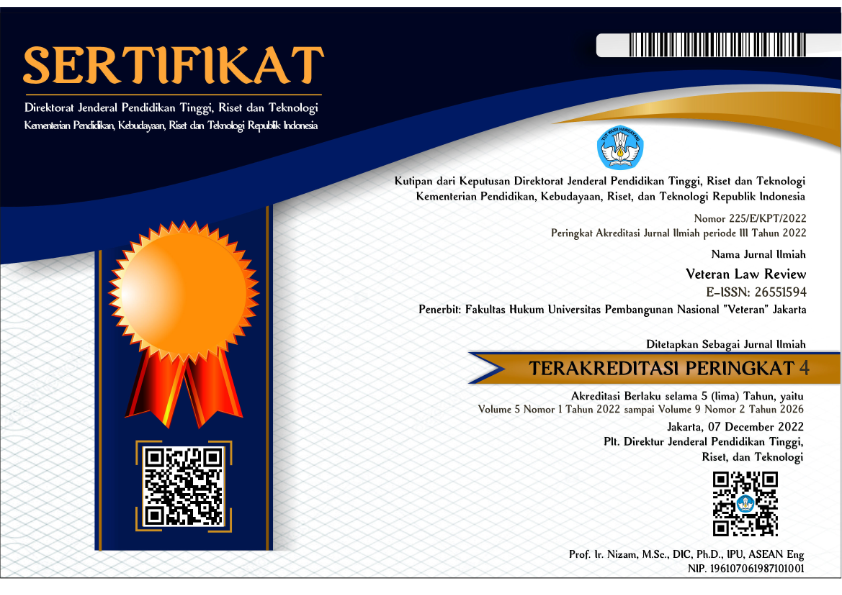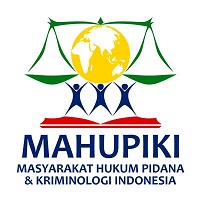Environmental Disputes Without The Principle Of Strict Liability After The Job Creation Law Regime
Keywords:
Job Creation Law, Strict Liability, Environmental Disputes, Liability Based on FaultAbstract
The 1945 Constitution of the Republic of Indonesia in Article 28 H paragraph 1 states that a good and healthy environment is a human right and a constitutional right for every Indonesian citizen. The form of environmental protection is then accommodated, one of which is in Article 88 of Law Number 32 of 2009 concerning Environmental Protection and Management (UU PPLH) through the Strict Liability principle or what is called absolute responsibility for every party who pollutes and destroys the environment caused by Hazardous and Toxic Materials (B3) and B3 waste without the need for proof of the element of error first. However, after the enactment of Law Number 11 of 2020 concerning Job Creation, absolute responsibility for perpetrators of environmental destruction has disappeared due to the abolition of the phrase "without the need for proof of the element of fault" so that accountability is based on fault (liability based on fault). The purpose of this study was to determine the impact of the abolition of the principle of strict liability in the settlement of environmental disputes in Indonesia. The research method used is normative legal research using statutory, conceptual, and case approaches. Based on the results of the study, it is shown that the abolition of strict liability in the PPLH Law will burden victims in environmental disputes, especially ordinary people, to ask for accountability because of the complexity of proving the element of error in industrial activities that use high technology and is directly related to B3 (ultrahazardous activity and abnormally dangerous).
Downloads
References
Akib, M. (2014). Hukum Lingkungan Perspektif Global dan Nasional. Jakarta: Raja Grafindo Persada.
Amania, N. (2020). Problematika Undang-Undang Cipta Kerja Sektor Lingkungan Hidup. Syariati: Jurnal Studi Al-Qur'an dan Hukum, 6(02), 209-220.
Apriani, T. (2020). Kedudukan Doktrin Res Ipsa Loquitur (Doktrin Yang Memihak Pada Korban) Dalam Tata Hukum Indonesia. Ganec Swara, 14(1), 401-405.
Aziz, A. S. (2019). Pancasila Sebagai Cita Luhur Pembangunan Hukum Nasional. QISTIE, 12(2), 219-238.
Efendi, J., & Ibrahim, J. (2016). Metode Penelitian Hukum Normatif dan Empiris. Jakarta: Prenada Media Group.
Feriandi, Y. A. (2018). Upaya perlindungan lingkungan perspektif konstitusi dan pendidikan kewarganegaraan. Jurnal Pancasila dan Kewarganegaraan, 3(2), 28-35.
Handayani, E. P., Arifin, Z., & Virdaus, S. (2019). Liability Without Fault Dalam Penyelesaian Sengketa Lingkungan Hidup Di Indonesia. ADHAPER: Jurnal Hukum Acara Perdata, 4(2), 1-19.
Hartati, S., Sintara, D., & Maryani, H. (2022). Utilization Of State Property By Partners In The Perspective Of Utilitarianism Legal Theory. Veteran Law Review, 5(1), 15-26.
Herlina, N. (2017). Permasalahan lingkungan hidup dan penegakan hukum lingkungan di Indonesia. Jurnal Ilmiah Galuh Justisi, 3(2), 162-176.
Imamulhadi, M. (2013). Perkembangan Prinsip Strict Liability Dan Precautionary Dalam Penyelesaian Sengketa Lingkungan Hidup Di Pengadilan. Mimbar Hukum-Fakultas Hukum Universitas Gadjah Mada, 25(3), 416-432.
Kolosa, Blair J. & Meyer, Bernadine. (1978). The American Legal System. New Jersey: Prentie Hall.
Machmud, S. (2012). Penegakan Hukum Lingkungan Indonesia. Yogyakarta: Graha Ilmu.
Mina, R. (2016). Desentralisasi perlindungan dan pengelolaan lingkungan hidup sebagai alternatif menyelesaikan permasalahan lingkungan hidup. Arena Hukum, 9(2), 149-165.
Muamar., Utari, A. A. S. (2020). Pengaruh Penghapusan Asas Strict Liability Dalam Undang-Undang Cipta Kerja Terhadap Masif Deforestasi di Indonesia. Jurnal Kertha Negara, 8(12), 1-12.
Nasution, A. I. (2021). The Changes Impact on State Ministries Nomenclature Toward National Development Progress. Veteran Law Review, 4(2), 94-108.
Pasapan, P. T. (2020). Hak Asasi Manusia dan Perlindungan Lingkungan Hidup. Paulus Law Journal, 1(2), 48-58.
Praja, C. B. E., Nurjaman, D., Fatimah, D. A., & Himawati, N. (2016). Strict Liability Sebagai Instrumen Penegakan Hukum Lingkungan. Varia Justicia, 12(1), 42-62.
Prakoso, A. L. (2016). Prinsip Pertanggungjawaban Perdata Dalam Perspektif Kitab Undang Undang Hukum Perdata dan Undang Undang Nomor 32 Tahun 2009 tentang Perlindungan dan Pengelolaan Lingkungan Hidup. In Prosiding Seminar Nasional: Tanggung Jawab Pelaku Bisnis Dalam Pengelolaan Lingkungan Hidup (Vol. 215).
Rianda, H. G. (2021). Problematika Konsepsi Strict Liability dalam Perlindungan Lingkungan Hidup Pasca Disahkannya Undang-Undang Nomor 11 Tahun 2020 Tentang Cipta Kerja. Muhammadiyah Law Review, 5(2), 100-109.
Sugiyono, H., & Haryanto, I. (2021). Plantation Regulation In The Palm Industry Sector In The Omnibus Law Of Employment Creation (Cipta Kerja). Veteran Law Review, 4(1), 14-34.
Sutrisno, N., & Poerana, S. A. (2020). Reformasi Hukum Dan Realisasi Investasi Asing Pada Era Presiden Joko Widodo. Undang: Jurnal Hukum, 3(2), 237-266.
Sutoyo, S. (2013). Paradigma Perlindungan Lingkungan Hidup. ADIL: Jurnal Hukum, 4(1), 192-206.
Wibisono, Andri G. (2018). Penegakan Hukum Lingkungan Melalui Pertanggungjawaban Perdata. Jakarta: BP-FHUI
Downloads
Published
How to Cite
Issue
Section
License
Copyright (c) 2023 Veteran Law Review

This work is licensed under a Creative Commons Attribution-ShareAlike 4.0 International License.
Copyright (c) 2022 Veteran Law Review Journal
Veteran Law Review © 2022 by Faculty of Law Universitas Pembangunan Nasional "Veteran" Jakarta is licensed under Creative Commons Attribution 4.0 International

1. License
The non-commercial use of the article will be governed by the Creative Commons Attribution license as currently displayed on Creative Commons Attribution 4.0 International.
2. Author(s)' Warranties
The author warrants that the article is original, written by the stated author(s), has not been published before, contains no unlawful statements, does not infringe the rights of others, is subject to copyright that is vested exclusively in the author, and free of any third party rights, and that any necessary written permissions to quote from other sources have been obtained by the author(s).
3. User/Public Rights
VELREV's spirit is to disseminate articles published are as free as possible. Under the Creative Commons Attribution-ShareAlike 4.0 International License. VELREV permits users to copy, distribute, display, and perform the work for non-commercial purposes only. Users will also need to attribute authors and VELREV to distributing works in the journal and other media of publications.
4. Rights of Authors
Authors retain all their rights to the published works, such as (but not limited to) the following rights;
- Reproduce the work
- Prepare derivative works based upon the work
- Distribute copies of the work
- Perform the work publicly
- Display the work publicly
- Copyright and other proprietary rights relating to the article, such as patent rights,
- The right to self-archive the article,
- The right to enter into separate, additional contractual arrangements for the non-exclusive distribution of the article's published version (e.g., post it to an institutional repository or publish it in a book), with an acknowledgement of its initial publication in this journal (Veteran Law Review).
5. Co-Authorship
If the article was jointly prepared by more than one author, any author submitting the manuscript warrants that he/she has been authorized by all co-authors to be agreed on this copyright and license notice (agreement) on their behalf, and agrees to inform his/her co-authors of the terms of this policy. VELREV will not be held liable for anything that may arise due to the author's internal dispute. VELREV will only communicate with the corresponding author.
6. Royalties
Being an open accessed journal and disseminating articles for free under the Creative Commons license term mentioned, author(s) are aware that VELREV entitles the author(s) to no royalties or other fees.
7. Miscellaneous
VELREV will publish the article (or have it published) in the journal if the article’s editorial process is successfully completed. JOSI's editors may modify the article to a style of punctuation, spelling, capitalization, referencing, and usage that deems appropriate. The author acknowledges that the article may be published so that it will be publicly accessible and such access will be free of charge for the readers as mentioned in point 3.

















